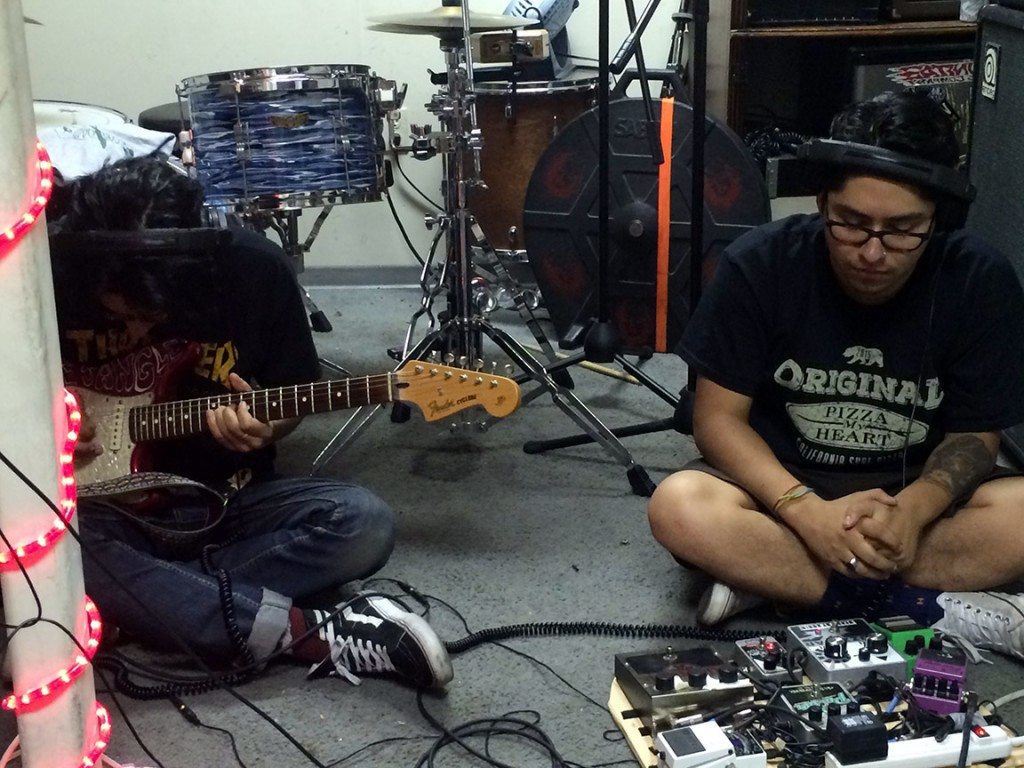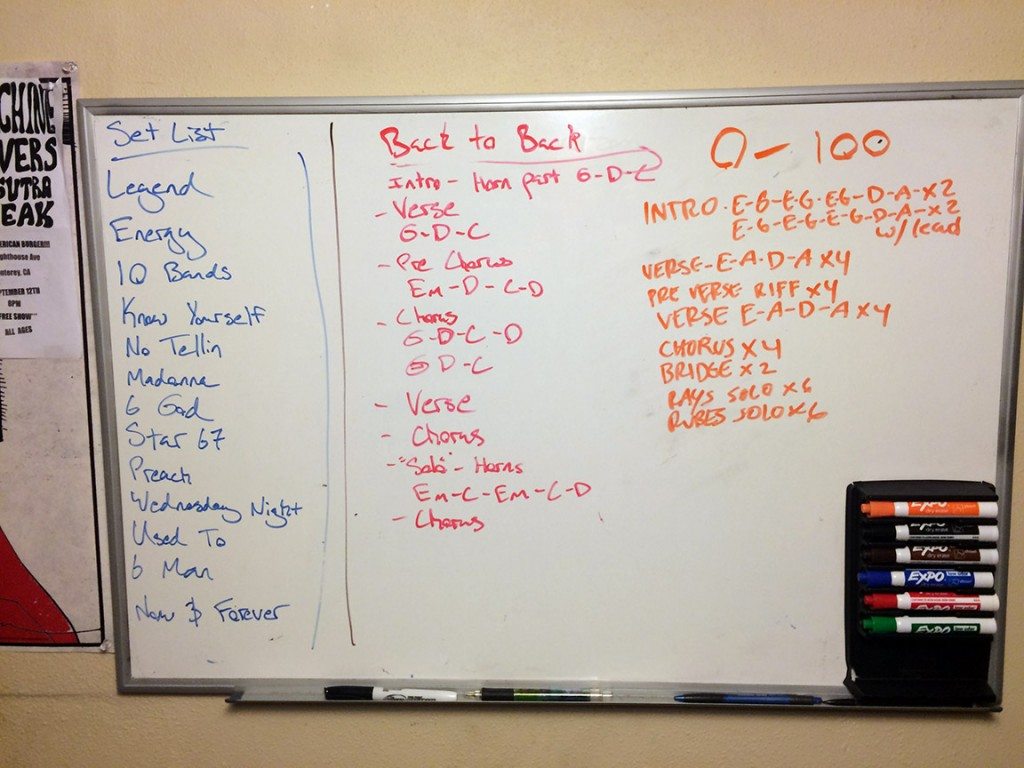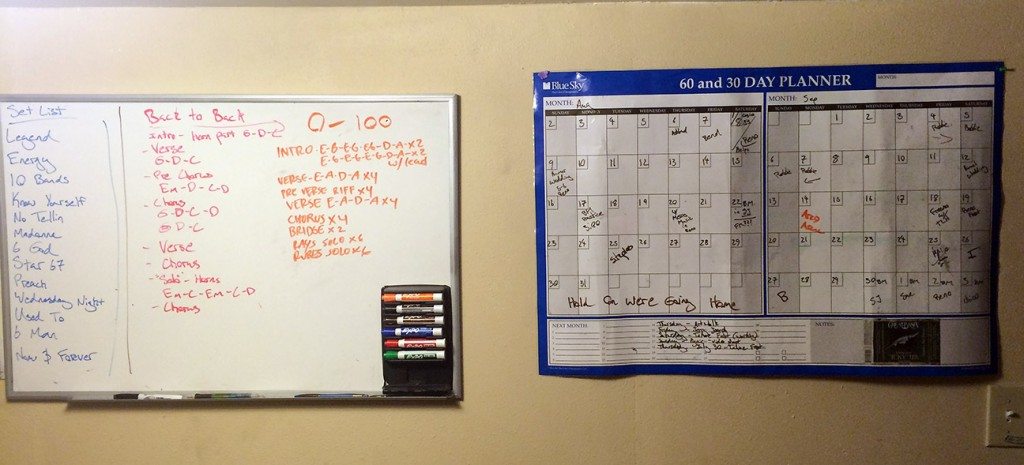
Spencer Kilpatrick/ Tahoe Onstage
Editor’s note: This is the second in a series of articles about starting a band.
Before you come up with a band name, before you make any of those annoying social media accounts, hell, before you even tell your friends you’ve started a band, you absolutely have to get in a couple of practices. Scheduling those first few practices will give you a pretty clear idea of who is going to make the band a priority.
If your initial lineup is proving to be even more unreliable than expected, do yourself a favor and hop back over to square one and start the search again. Forcing something as naturally fragile as a band will either cause the group to stall from the get-go or become a nightmare over time. Just take a breath, try out another bassist or drummer or whatever it is and keep working on your songs.
Taking the time to find the people willing to make practice a priority will be worth it. After all, anyone will show up to rehearse with a band that plays packed shows and records great music but the type of person who will show up to work with a band that has no name, no songs and no fans is a special kind of stupid. The kind you need.
Whether you’re showing songs to prospective members or you’ve found your core group and are ready to get started, here are a few things to keep in mind that can help with efficient practices.
Scheduling
You’re excited, you finally have people who gel and appear to be able to work together in some capacity. This is where you might be tempted to schedule as many rehearsals as you can. While the enthusiasm is terrific, this can potentially burn out other members of the band. They’ll get tired of the constant pestering and nightly practices, and they’ll slowly become more distant. The point is, don’t overwork yourself and the band right from the beginning. Giving yourself time between rehearsals to write material and clear your mind will help you more effectively manage the time that you guys have together.
Also, practicing every night may give you time to come up with new ideas, but probably not enough time to flesh them out. A few days between rehearsals will help you turn that riff you’ve been noodling around with into a full-fledged arrangement that can be used as a starting point at the beginning of next practice.
What has worked best for me in the past is aiming for two practices a week. Put one practice on a solid weekly schedule and make the other rehearsal a “floater”(ewwww). The floater is based on the unpredictability of three to five people’s daily lives. Fit it in when you can.
Communication is key! Between school, work, family and miscellaneous obligations, it can be a task to find a time that works for everyone and often results in a series of group texts that, when unanswered, can cause everyone in the group to relentlessly talk shit about the one person who never responds. Make sure to set up a communication system (texting, email, smoke signals, Facebook, etc.) which everyone checks and responds to regularly.
Lastly, before you practice, make sure you have a list of things you want to accomplish. Scheduling a time for five people to get into a room and look around for someone with an idea doesn’t help anyone. Have a plan.
 White board
White board
Go to Target and spend a few bucks on a dry-erase board or two. They’ll help you organize everything from individual song arrangements to set lists to important upcoming dates to a list of local spots to flier for your next show. Rehearsing with a white board will not only keep everyone in the band on roughly the same page but will help you become a more organized and efficient human being.
The ability to write out a clear and realistic to-do list will carry over into other aspects of your life as quickly as you let it.
Get to practice early and write out your band’s to-do list. Doing so will help instill a sense of purpose and direction. Don’t skip this step, ya dummies.
Mistakes
When someone makes a mistake, don’t stop the song, sigh, roll your eyes, then start over. No matter how well rehearsed you are, mistakes will happen when you play live, it’s the mark of an experienced band to be able to move past that them with poise.
Practice full run-throughs of the songs and deal with the little fuck-ups afterwards. Otherwise, when your songs fall apart on stage you won’t know how to do anything but stop and start over. Not a good look.
Respect
There’s a lot to be said about how mutual respect in the rehearsal room will push your band past the inherent insecurities of songwriting and performing into a comforting, supportive environment, thus allowing the group to reach its full potential. … but I don’t really care about that so let’s keep this one short: Hey Drummers!! Stop mashing on your kit while everyone else is talking. You’re being an asshole.
Beer
This isn’t just on the list because I love beer, there’s a certain amount of pragmatism here. Check it out — you’re a new band that is likely going to be playing bars. New bands get nervous before shows and often have a couple beers to take the edge off. If you haven’t been practicing with a few beers in your system then this can throw off your performance and cause you to ruin the gig.
Also, new bands tend to have timid singers. A few beers will lower inhibitions and get, at the very least, a less mumbly practice out of your friend who’s never had his or her voice amplified before.
There’s always the risk of overdoing it but that risk is as much about figuring out personal limits as it is about having a good time with the people that you, with any luck, will be spending most of your time from here on out.
Of course this is all up to you. I’ve met bands that stay completely sober for their shows. They’re always very nice and play a very nice set of very nice songs on very nice equipment. I don’t much care for them.
Quick Tip: “I feel sorry for those who don’t drink because when they get up in the morning that’s as good as they’re going to feel all day.” — Frank Sinatra
White board
Yeah, it’s on the list twice. A white board is probably more important to have in the practice room than a bass player (and definitely more important than a keyboardist. …yuck). So go to the store and buy one. RIGHT NOW!
Party on
Lastly, make sure you’re having fun. The practice spot can be a sweaty, smelly, inhospitable place with the potential to ruin relationships. There’s nothing wrong with taking time between songs to shoot the shit with your friends, just try to get a few tunes worked out as well. Remember, it’s only rock n’ roll.
Related story: Part 1 — It takes a special kind of stupid. LINK



3 Responses
Your Rad, keep up the good work Keeeelpatro
good job on your second article about starting a band…very talented kid!!!
fine writing. if you’re not gonna drink, you’d better be a genuinely fun person